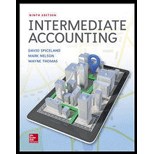
INTERMEDIATE ACCOUNTING (LL) W/CONNECT
9th Edition
ISBN: 9781260679694
Author: SPICELAND
Publisher: MCG
expand_more
expand_more
format_list_bulleted
Concept explainers
Question
Chapter 17, Problem 17.5BYP
(1)
To determine
Pension plan: This is the plan devised by corporations to pay the employees an income after their retirement, in the form of pension.
Types of pension plans:
- Defined contribution pension plans: In such plans, employers contribute fixed amounts annually, to the pension fund. The benefit amounts are based on size of pension fund available at the time of retirement. There is no commitment on the part of the employers to pay fixed retirement benefits.
- Defined benefit pension plans: In such plans, employers pay annual fixed contributions to employees as retirement benefits. Employers promise to pay fixed retirement benefits, which are computed based on the service period of employee, annual compensation of the employee, and age.
To mention: The type of pension plan offered by Corporation M
(2)
To determine
To mention: The persons who suffer the risk of reduction in retirement benefits in the plan offered by Corporation M
(3)
To determine
The amount entitled by an employee who contributes $1,000 in first year, and leaves the company in early second year, when the mutual fund of contributions value is 2%
(4)
To determine
To describe: The accounting treatment of pension plan for 2015
Expert Solution & Answer
Want to see the full answer?
Check out a sample textbook solution
Students have asked these similar questions
I am looking for the correct answer to this general accounting problem using valid accounting standards.
what is the total market value of the componys equity ? accounting question
Need help qui
Chapter 17 Solutions
INTERMEDIATE ACCOUNTING (LL) W/CONNECT
Ch. 17 - Prob. 17.1QCh. 17 - Prob. 17.2QCh. 17 - Prob. 17.3QCh. 17 - What is the vested benefit obligation?Ch. 17 - Prob. 17.5QCh. 17 - Prob. 17.6QCh. 17 - Name three events that might change the balance of...Ch. 17 - Prob. 17.8QCh. 17 - Prob. 17.9QCh. 17 - Prob. 17.10Q
Ch. 17 - The return on plan assets is the increase in plan...Ch. 17 - Define prior service cost. How is it reported in...Ch. 17 - Prob. 17.13QCh. 17 - Is a companys PBO reported in the balance sheet?...Ch. 17 - What two components of pension expense may be...Ch. 17 - Prob. 17.16QCh. 17 - Evaluate this statement: The excess of the actual...Ch. 17 - Prob. 17.18QCh. 17 - TFC Inc. revises its estimate of future salary...Ch. 17 - Prob. 17.20QCh. 17 - Prob. 17.21QCh. 17 - Prob. 17.22QCh. 17 - The components of postretirement benefit expense...Ch. 17 - The EPBO for Branch Industries at the end of 2018...Ch. 17 - Prob. 17.25QCh. 17 - Prob. 17.26QCh. 17 - Prob. 17.1BECh. 17 - Prob. 17.2BECh. 17 - Prob. 17.3BECh. 17 - Prob. 17.4BECh. 17 - Prob. 17.5BECh. 17 - Prob. 17.6BECh. 17 - Prob. 17.7BECh. 17 - Prob. 17.8BECh. 17 - Prob. 17.9BECh. 17 - Prob. 17.10BECh. 17 - Net gain LO176 The projected benefit obligation...Ch. 17 - Prob. 17.12BECh. 17 - Prob. 17.13BECh. 17 - Postretirement benefits; determine the APBO and...Ch. 17 - Prob. 17.15BECh. 17 - Prob. 17.1ECh. 17 - Prob. 17.2ECh. 17 - Prob. 17.3ECh. 17 - Prob. 17.4ECh. 17 - Prob. 17.5ECh. 17 - Prob. 17.6ECh. 17 - Prob. 17.7ECh. 17 - Prob. 17.8ECh. 17 - Prob. 17.9ECh. 17 - Prob. 17.10ECh. 17 - Prob. 17.11ECh. 17 - PBO calculations; ABO calculations; present value...Ch. 17 - Prob. 17.13ECh. 17 - Prob. 17.14ECh. 17 - Prob. 17.15ECh. 17 - Prob. 17.16ECh. 17 - Prob. 17.17ECh. 17 - Prob. 17.18ECh. 17 - Prob. 17.19ECh. 17 - Prob. 17.20ECh. 17 - Prob. 17.21ECh. 17 - Prob. 17.22ECh. 17 - Prob. 17.23ECh. 17 - Prob. 17.24ECh. 17 - Prob. 17.25ECh. 17 - Prob. 17.26ECh. 17 - Prob. 17.27ECh. 17 - Prob. 17.28ECh. 17 - Prob. 17.29ECh. 17 - Prob. 17.30ECh. 17 - Prob. 17.31ECh. 17 - Prob. 17.32ECh. 17 - Prob. 17.33ECh. 17 - Prob. 17.1PCh. 17 - PBO calculations; present value concepts LO173...Ch. 17 - Service cost, interest, and PBO calculations;...Ch. 17 - Prob. 17.4PCh. 17 - Prob. 17.5PCh. 17 - Prob. 17.6PCh. 17 - Determining the amortization of net gain LO176...Ch. 17 - Prob. 17.8PCh. 17 - Prob. 17.9PCh. 17 - Prob. 17.10PCh. 17 - Prob. 17.11PCh. 17 - Prob. 17.12PCh. 17 - Prob. 17.13PCh. 17 - Prob. 17.14PCh. 17 - Prob. 17.15PCh. 17 - Prob. 17.16PCh. 17 - Prob. 17.17PCh. 17 - Prob. 17.18PCh. 17 - Prob. 17.19PCh. 17 - Prob. 17.20PCh. 17 - Prob. 17.21PCh. 17 - Prob. 17.1BYPCh. 17 - Prob. 17.2BYPCh. 17 - Prob. 17.3BYPCh. 17 - Prob. 17.5BYPCh. 17 - Prob. 17.6BYPCh. 17 - Prob. 17.7BYPCh. 17 - Prob. 17.8BYPCh. 17 - Prob. 17.9BYPCh. 17 - Prob. 17.11BYPCh. 17 - Prob. 1CCTCCh. 17 - Prob. 1CCIFRS
Knowledge Booster
Learn more about
Need a deep-dive on the concept behind this application? Look no further. Learn more about this topic, accounting and related others by exploring similar questions and additional content below.Similar questions
- Solve this qn plzarrow_forwardI am searching for the accurate solution to this general accounting problem with the right approach.arrow_forwardRichard Gear Co. manufactures mountain bike tires. The tires sell for $75. The variable cost per tire is $40, and monthly fixed costs are $360,000. If the company is currently selling 18,000 tires monthly, what is the degree of operating leverage?arrow_forward
arrow_back_ios
SEE MORE QUESTIONS
arrow_forward_ios
Recommended textbooks for you
